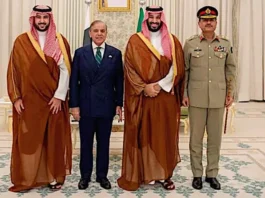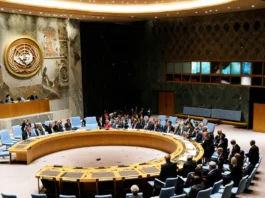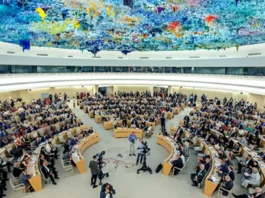Overview of the Conference
The UN High-Level Conference on Palestine, held on July 29, marked a significant moment in global discourse regarding the ongoing Israeli-Palestinian conflict. This high-level gathering was convened by the UN General Assembly to address critical concerns surrounding the question of Palestine, which has persisted for decades. The primary purpose of the conference was to bring attention to the urgent need for renewed international commitment towards achieving a lasting resolution in the form of a two-state solution, envisioned as a means to end hostilities and foster peace in the region.
Co-chaired by France and Saudi Arabia, the conference drew participation from a diverse array of stakeholders, including member states, international organizations, and representatives from civil society. This coalition emphasized a unified approach to the issues at hand, highlighting the necessity for collective action. The two co-chairs played pivotal roles in steering discussions, underscoring their respective nations’ longstanding engagement with the Palestinian cause and regional stability. This collaboration was crucial in facilitating dialogue among participants, enabling varied perspectives to be voiced while focusing on the common goal of promoting peace and security.
Notably, the conference spotlighted the worsening humanitarian crisis in Gaza, with participants advocating for the urgent need to address the plight of civilians affected by conflict. Efforts were directed towards raising awareness on the critical humanitarian needs and the importance of improving living conditions in the region. The emphasis on tackling the humanitarian dimensions of the crisis reflected an understanding that any sustainable solution must consider the realities faced by the Palestinian people. Ultimately, this gathering served as a clarion call for renewed global commitment to peace efforts, reconciliation, and the pursuit of justice in the ongoing complex situation surrounding Palestine.
Urgency and Accountability in Gaza
The recent UN High-Level Conference on Palestine brought to the forefront the dire situation in Gaza, with numerous representatives and ministers articulating their grave concerns about the ongoing humanitarian crisis. Within their discourse, some officials went as far as to label the current condition in Gaza as a form of genocide. Such serious allegations demand urgent international attention and action, emphasizing an imperative need for accountability and justice. The discourse revolved around the critical necessity to secure a viable Palestinian state, which advocates argue represents a fundamental path towards peace and stability in the region.
During the conference, myriad voices stressed that the plight of the Palestinian people cannot be ignored. The humanitarian implications of the situation in Gaza were thoroughly examined, with several ministers highlighting that the ongoing violence and blockade are severe violations of human rights and international law. For instance, one prominent delegate noted, “We must not shy away from calling this what it is: a systematic deprivation of basic human rights, resulting in conditions that fall under international criminal law.” Such statements underscored not only the urgency of action but also a broader call for advocacy on behalf of those impacted in Gaza.
The discourse pivoted significantly towards the idea that international inaction perpetuates the suffering of the Palestinian population. Advocates for Palestinian statehood argued that a peaceful resolution hinges on recognizing the rights of Palestinians to self-determination and sovereignty. The conference served as a platform to rally support for renewed diplomatic efforts aimed at fostering dialogue and understanding, which are crucial to creating lasting solutions to these pressing issues. As discussions conclude, the commitment to pivot from mere rhetoric to concrete action remains a focal point among global leaders aiming to bring about meaningful change in Gaza.
Global Actions and New Commitments
During the UN High-Level Conference on Palestine, participating countries made significant commitments aimed at addressing the ongoing challenges faced by the Palestinian people. Among the notable outcomes of the conference was the conditional recognition of Palestinian statehood, a pledge that underscores a growing recognition among the international community of the need for a viable, sovereign state for the Palestinians. The conditions attached to this recognition, particularly from nations like the United Kingdom, highlight the complexities involved in resolving the Israeli-Palestinian conflict. The UK indicated that it would consider recognizing Palestine at the upcoming September assembly, depending significantly on Israel’s willingness to engage in constructive dialogue and take tangible steps toward peace.
In addition to statehood recognition, various countries pledged to enhance humanitarian aid initiatives aimed at alleviating the suffering in Palestine. China reaffirmed its commitment to supporting Palestine through financial assistance and development aid. This contribution is crucial, particularly in light of the severe humanitarian challenges faced by the population. San Marino, although a smaller nation, expressed its dedication to promoting peace and gaining better support for Palestinian causes within international forums. Meanwhile, Armenia emphasized its historical solidarity with Palestine, asserting its role in advocating for the rights of Palestinian citizens on the global stage.
The collective spirit reflected in these commitments from diverse countries illustrates a united front aimed at achieving a peaceful resolution to the conflict. The emphasis on humanitarian aid illustrates a recognition of the urgent need for immediate support for those affected by the ongoing crisis. Such actions demonstrate a broader shift in international relations concerning Palestine, emphasizing the importance of collaboration and the pursuit of justice for the Palestinian people.
Support for the Two-State Solution and Humanitarian Concerns
The UN High-Level Conference on Palestine highlighted a prevailing consensus among delegates regarding the endorsement of the two-state solution as a crucial strategy toward achieving sustainable peace between Israel and Palestine. This approach advocates for the establishment of an independent Palestinian state alongside Israel, fostering coexistence and addressing the deep-rooted tensions that have persisted for decades. The commitment to this framework is not only a diplomatic necessity but also a reflection of the international community’s recognition of the rights of both Palestinians and Israelis to self-determination.
However, the conference did not shy away from addressing the grim realities affecting the peace process, particularly criticisms aimed at Israel’s recent legislative actions concerning the annexation of the West Bank. Such measures have been condemned by numerous nations, as they are perceived as significant obstacles to negotiations aimed at establishing the two-state solution. The delegates expressed deep concern regarding the impact of these actions on the viability of a Palestinian state and the overall prospects for peace in the region. This consensus underscores the importance of adhering to international law and existing agreements that support the establishment of a viable Palestinian state within recognized borders.
Furthermore, the humanitarian crisis in Gaza looms large, with various countries denouncing the situation and urging immediate investigations into potential violations of international law. The delegates emphasized the urgent need for international cooperation to address these humanitarian concerns, advocating for a swift and substantial response to alleviate the suffering faced by the civilian population in Gaza. The discussions underscored a collective call for action, emphasizing that restoring humanitarian dignity is indispensable for any lasting resolution to the conflict. As the international community navigates these complex issues, it remains vital to maintain focus on the two-state solution while addressing the pressing humanitarian needs on the ground.




